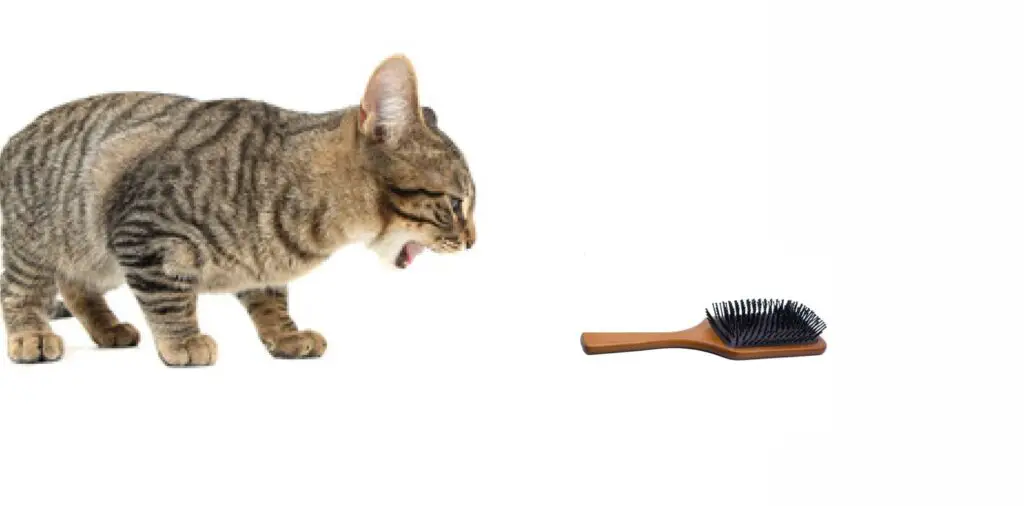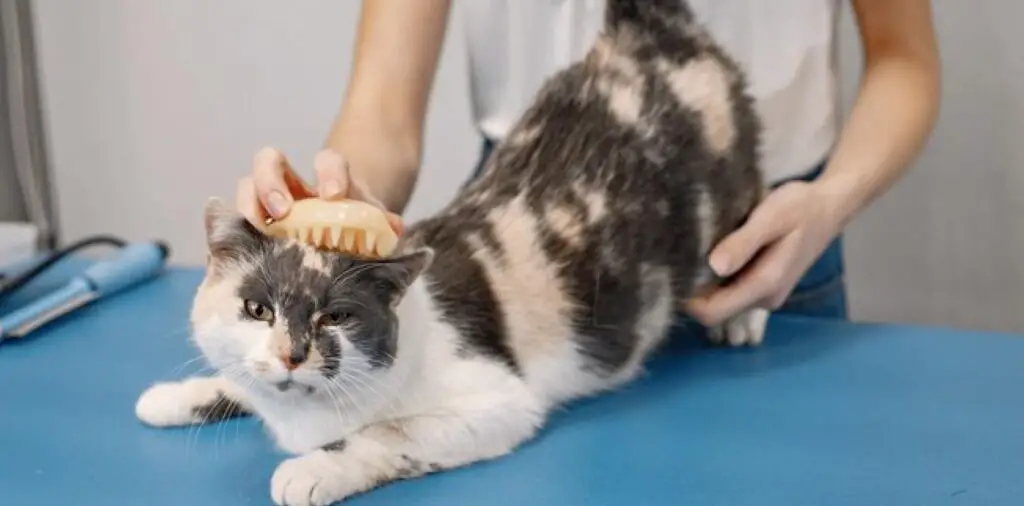So, why do cats gag at combs? Cat (Felis catus) is the smallest tamed member in the order Carnivora and is from the Felidae family. We call them house cats or domestic cats. Felines have supple low-slung bodies, elongated tails for balancing, and teeth and claws that allow them a life of active hunting like other animals of the Felidae family. Like their wild ancestors, cats are primarily carnivorous, highly agile and strong, and well-coordinated in their movements.
Are you a cat owner? If so, have you attempted to bother them by making uncomfortable sounds, such as sliding your fingers across the comb’s teeth or crinkling foil paper? Again, if you answered yes, have you ever questioned why your cat responds the way it does? So, here’s an explanation for why cats respond to combs.
What causes cats to respond to combs? Cats are apex predators, and almost all of their prey communicate via ultrasonic sounds. Because cats are sensitive to high-pitched noises, they react to combs. Their sensitivity comes in handy when hunting. Aside from the comb, your cat may also react to certain other high-pitched sounds.
That is the most straightforward response you will get. Nonetheless, there is a more general explanation for why cats respond to the noise of combs.
Apart from the noise of combing, other items may annoy or make your cat gag. We’ll double-check everything!
Why Do Cats Gag at the Sound of Combs?

Because cats have an acute and powerful sense of hearing, the noise of a comb makes them gag. When they hunt, their sensitive hearing aids them. It enables them to hear whether prey or predators are nearby. A cat responds when it hears the sound of a comb. Continue reading to learn why cats are responsive to noises.
FARS
Feline Audiogenic Reflex Seizures (FARS) are a kind of epilepsy recently recognized in cats. High-pitched or loud stimuli induce it, and it is typical in elderly cats.
Hearing loss is a natural part of aging, and the capacity to hear lower-pitched noises is usually the first to go. That is why cats are more startled by high-pitched noises.
What Other Sounds or Noises Do Cats Gag At?

A few of the things making cats gag is the noise of the comb. Other items, on the other hand, can make cats vomit. What exactly are they? Other items that make cats gag, apart from the sound of the comb, are:
- Foil paper crinkling
- Running water sounds
- Sound of the coffee grinder
- Glass chinking or tapping
- The sound of money or keys clinking
- The sound of a nail hammering
- The owner’s tongue clicking
Some owners claim that their cats get violent when they hear these sounds. This is something that many have noticed in their life.
When cats hear these sounds, they may become more aggressive and suffer seizures. Older cats are more likely to suffer seizures when exposed to loud noises such as crinkling aluminum foil or shopping bags, clicking computer keyboards, rushing water, and computer printers.
Feline Audiogenic Reflex Seizures, or FARS, is this type of condition. Some owners claim that these sounds cause their cats to have seizures, so the only solution to stop them is to avoid making these sounds.
In addition to your gorgeous cat, other animals may have seizures in response to certain auditory triggers. For example, rats, mice, hamsters, and puppies are all susceptible to seizures when exposed to these noises.
What Does It Mean When Cats Gag?
Inflammation or discomfort in the trachea or bronchi triggers the gag reflex, which various illnesses ranging from moderate to severe can cause. When a cat eliminates an allergen from its larynx, a reflex leads it to gag.
If his larynx is touched, a cat will vomit. It is accompanied by swallowing, neck extension, and mouth broadening. The episode is intended to evacuate anything that has irritated his throat, whether real or imagined. Puking and gagging are typical, but you should take them seriously if they occur regularly.
Why Do Cats Hear High-Frequency Vibrations??
Cats’ hearing is incredibly keen, allowing them to perceive high-frequency vibrations. Their inner ear can perceive noises that are too loud for human hearing.
The capacity to detect high-frequency vibrations aids cats in surviving in the wild by allowing them to detect prey and predator movements. They can also converse with other cats to detect high-frequency vibrations from purring and meowing.
So the next moment that cat gasps at the look of a comb, consider it isn’t because they’re picky. It’s just because their remarkably good hearing allows them to detect sounds that humans can’t.
Do Other Sounds Make Cats Gag?
While the noise of a comb might be too much for them, various noises can make them gag. For example, the audio of a vacuum engine, the buzzing of a smartphone, and the rustling noises of foil wrappers are all frequent instances.
This is because all of these noises create high-frequency vibrations comparable to the comb’s sound. As a result, the cat’s very sensitive hearing becomes overstimulated, causing them to choke or flee.
Why Do They Gag When Being Brushed?

Gagging cats may indicate that they dislike having their hair touched by people. Therefore brushing them is not recommended. Numerous cats have lengthy hair, making brushing more complex, and can cause discomfort if tugged too forcefully or for an extended period.
Giving your cat treats while brushing them is the greatest method to get them acclimated to it before you brush them. This helps the cat connect being stroked with something pleasant, increasing the likelihood that it will enjoy the encounter.
Should I Be Worried If My Cat Gags?
When cats are threatened or don’t like what they’ve seen, they utilize gagging as an automatic defense strategy. It’s nothing to be concerned about, provided that the gagging doesn’t become extreme.
But, if your cat starts wheezing heavily while at it, this might be a sign that something is wrong, and you should seek medical help.
It’s usually good to take your cat to the veterinarian if they’re gagging without any apparent cause. FARS, allergies, respiratory difficulties, and even dental disease are all possible reasons for inexplicable gag reflexes in cats.
What Are the Other Causes for Cat Gagging?
Gagging at combs in cats can be caused by their keen hearing, but many other possibilities exist. Here are a few examples:
- Feline Asthma is a lung ailment that affects both cats and dogs. Whenever the bronchi in the cat’s nostrils become inflamed, making breathing difficult.
- Due to their weakened immune systems, cats experiencing FARS are much more likely to acquire Asthma, making them more susceptible to allergens.
- Allergies – Cats can be intolerant to many factors, such as dust and the human diet. This creates respiratory issues, causing individuals to choke or cough often. If you suspect your cat may have allergies, it’s critical to have them tested.
- Cats can suffer respiratory difficulties for various reasons, including foreign bodies in the airway, infections, and even cancer. These issues might lead the cat to frequently gag and make breathing difficult.
- Dental disease is among the most prevalent causes of gagging in cats. This happens when plaques and calculus accumulate on the cat’s teeth, causing discomfort and illness. If not addressed, dental illness can be fatal.
- Hairballs — cats groom themselves frequently, and they ingest a lot of hair. Therefore, this fur could form balls in the cat’s stomach, causing them to choke while trying to vomit them out.
If your cat is gagging severely, you should take him to the veterinarian. Before recommending therapy, doctors will be capable of conducting tests to determine the specific cause.
What Sounds Do Cats Like?
Because cats are extremely sensitive to sound, we must avoid playing noises that will lead them to have seizures, be startled, or get agitated.
You’re already aware of the sounds that cause a cat to choke and seize. So, let’s have a peek at the many noises that cats enjoy. We’ll discuss the sounds that cats despise later. Let’s get started!
Music
Music is the first sound that cats respond to. They make their own music and human music. Cats love music, according to research published in the journal Applied Animal Behavioral Science. According to the study, these noises are species-specific melodies representing the speed and frequency of cat vocalization.
The cats in the research were entertained by a song written especially for them. So, how can experts know that animals enjoy the music they’re listening to? Cats who enjoy music go toward it, purring and rubbing against the speakers.
Toy Noises
Cats enjoy playing with toys and prefer toys that mimic the noises of their prey.
Cats must play to survive. Why? Because it is here that they hone their hunting abilities. They will have the opportunity to use their intuition while playing.
The toys with noises are the most popular among cats. Sounds that will transport them to a true hunting scenario. Squeaky toys will fool your cat into thinking it’s a real mouse when rolled, bitten, or batted.
Their Food’s Sound
The noise of their meal is another sound that cats like hearing. Not wet food because shaking the container produces no sound. If you rattle the box of your cat’s dried food, your cat will come running.
What Sounds Do Cats Dislike?
You now know what noises cats enjoy. So let’s move on to the noises that they despise the most! They despise these sounds because they terrify and frighten them to death.
Appliances And Electronics
Because cats can detect sounds that humans cannot, the noise of a comb is irritating to them but not to us. Cats can be irritated by various stimuli that you are completely unaware of!
Most of our electrical equipment and appliances emit sounds that bother our kitties. Computers, televisions, smoke alarms, refrigerators, and even remotes produce high-frequency noises that we cannot hear. These are, nonetheless, among the most annoying noises for cats.
Humans have no understanding of how electrical and gadget noises harm the health of our pets. A study conducted at the Southern Illinois University School of Medicine explored the non-auditory effects of noise on mice.
The researchers discovered that noise affects mice’s cardiovascular and endocrine systems. It impacted their sleep, seizure susceptibility, and social behavior. The sound of your home appliances is unpleasant and dangerous to your cats.
Other Cats’ Hissing Sounds
Your cat will be bothered by hissing. As a result, if you attempt to play certain growling noises from YouTube, your cat might flee or locate the cat creating the noise. Try it for yourself and see what you think.
Cats hiss when they feel threatened. They use this to frighten other cats or to ward off a threat. A mother cat may hiss if another cat or animal comes too close to her kittens. A sick or in agony cat may also hiss to keep rival cats away.
Some objects will sound like a cat’s hiss and cause your cat to hiss. What exactly are they?
The items that will make your cat hiss include Baygon spray, a jacket, and a fluttering plastic bag.
Thunder and Other Loud Noises
Loud sounds, such as thunder, are another sensation that cats despise.
Cats, as previously said, have acute hearing. They are capable of hearing sounds that we are unaware of. Cats and their hearing are bothered by loud noises that humans can hear.
Fire alarms, passing ambulances or fire trucks, a noisy motorbike or automobile, an operating vacuum pump, or thunder can all harm your cats’ hearing.
Fortunately, cats have particular reflexes that allow them to avoid being exposed to loud noises. The small muscles inside the cat’s middle ear can constrict to protect its ears against loud sounds.
On the other hand, cats will never protect their ears from loud noises such as fireworks. It occurs too rapidly to enable their reflexes to kick in and protect their ear.
How To Help a Gagging Cat?
- Massage the neck of the cat. Try stroking it if it starts choking and coughing as though something is stuck in its throat. This relieves the spasming of the throat muscles, allowing the cat to swallow.
- Cover its nose with your hand. Help the cat swallow whatever is hurting its throat to stop it from choking. Hold the nose with your hands to stop it from breathing, causing it to swallow and clearing the throat.
- Keep your cat’s tongue still. Getting more air into the cat’s nose will help it quit gagging. Place your fingers in the cat’s mouth and gently keep the tongue down. This allows more air to enter the nose, which aids in the clearing of whatever is irritating it.
- You should use this procedure with caution since your cat may bite your finger.
- If your cat is in pain, take him to the veterinarian right away. Breathing difficulties, excessive drooling, a dry cough, disorientation, or blue gums might indicate that your cat is suffering from a serious illness.
Final Words – Why Do Cats Gag At Combs?
While seeing your cat gag at combs may be unnerving, it’s typically nothing to be concerned about because cats react this way towards high-frequency sounds.
Gagging occurs in cats for various causes, including sensitive hearing, respiratory difficulties, dental disorders, and hairballs. Whenever your cat is continually gagging, you should take them to the doctor for testing and treatment. It is very common to see a cat cough. However, there are very particular sound triggers that affect cats.
FARS is a disorder that causes some cats to choke or lose their hearing due to loud noises. If you suspect your cat has FARS, refer them to a physician who can identify the disease and, if required, provide medication.
